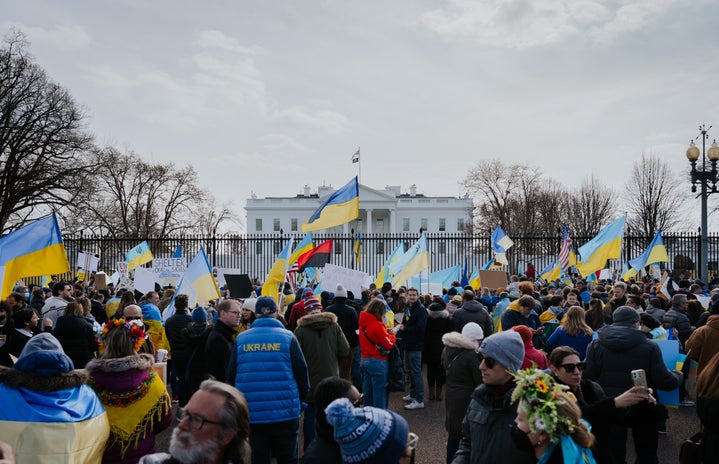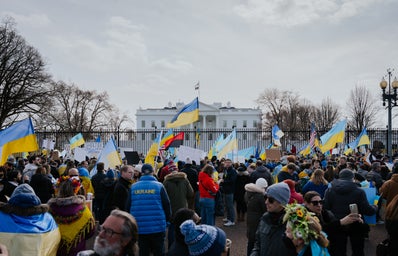Edited by Megan Cambruzzi
On February 24th, 2022, in a pre-dawn TV address, Russian President Vladimir Putin announced that Russia could not feel ‘safe, develop and exist’ due to a supposedly constant threat from modern Ukraine.
The strain between the two countries first started in 2014 when Russia responded to the ousting of pro-Russian president, Victor Yanukovych, by seizing Crimea in southern Ukraine, and supporting separatist forces that have battled with Ukrainians in a war that has caused about 14,000 casualties. Much later in 2021, Putin began stationing multiple troops near Ukrainian borders while denying any intent of attacking the country.
After months of increasing tension between the two countries, Putin entirely disregarded a long-standing peace-treaty – flooding into Ukraine with armed forces and sparking a mass exodus of refugees. Putin aims to “demilitarize and de-nazify to protect people subjected to bullying and genocide,” what is actually a vibrant democracy led by Jewish president Volodymyr Zelenskyy.
Now, nearly two weeks into the Russian invasion of Ukraine, with countless deaths, multiple sanctions being imposed on Russia and an abundance of misinformation and propaganda, Russia continues to direct an overwhelming amount of violence towards Ukraine – desperately trying to overthrow the country’s democratic government.
Prior to Russia’s actual invasion of the country, it had issued a list of security demands to Western countries, which notably included the cease of expansions of NATO to Ukraine and Georgia. Now, the two geopolitical poles continue engaging in a risky back-and-forth that holds hundreds of human lives in the midst under massive danger. While the West bears down on Russia with economic sanctions that are magnified every day, exacerbated by the exit of multinational corporations from the Russian economy, Russia in turn directs more brutality towards Ukraine.
However, the people at the forefront, making these decisions lose sight of the fact that political gambling has real-life consequences. It is no recent discovery that vulnerable populations such as women, children, elders, and LGBTQ+ pay the highest price during war. The humanitarian crisis caused by war only serves to augment the pre-existing patriarchal imbalance.
As highlighted in a manifesto published by Russian feminists that have amassed to carry out antiwar protests – “war means violence, poverty, forced displacement, broken lives, insecurity, and the lack of a future. It is irreconcilable with the essential values and goals of the feminist movement. War exacerbates gender inequality and sets back gains for human rights by many years. War brings with it not only the violence of bombs and bullets but also sexual violence.”
For countries that claim to have a “feminist” foreign policy, the past few days of heavy conflict and instability have made it clear that these practices exist only on paper but aren’t employed in real life. Western countries have continued to prioritize material, economic and state security over human life.
While feminism as an ideology stands against the eventual shift of Russia, with its newfound rigid censorship laws, to a dictatorship, it also places human life at the forefront and reminds decision makers during times like these that they are more than just abstractions. Feminist foreign policy also shifts the current paradigm by highlighting the marginalised and underprivileged groups. Over the next few days, it is essential that the world supports Ukraine’s sovereignty and agency while working closely with those that are at a disproportionate disadvantage on the ground in Ukraine.
With several countries such as Poland, Moldova, Hungary, etc. recognizing the plight of Ukrainian refugees and providing them with shelter and humanitarian aid, here’s how you can help those affected by this war.
1. DONATE TO REFUGEES
The UNHCR is the official UN Committee through which you can help refugees, while the Ukraine Crisis Relief Fund is an initiative by GlobalGiving to assist local Ukrainian charities.
International Rescue Committee is providing emergency support to refugees.
International Medical Corps and Médicins Sans Frontières are providing mental and physical health services to those stuck in Ukraine, and other refugees.
2. DONATE AND HELP VULNERABLE GROUPS
As LGBTQ+ continue to be one of the most jeopardised groups, donate to charities such as Choose Love and QUA that primarily assist members of the queer community.
3. SHARE INFORMATION ON LEGAL AID
As Ukrainian refugees are forced to flee in the country in panic, there are several laws that stand in their way of entering neighboring countries and seeking asylum. Multiple UNHCR partner organizations provide Ukrainians with legal aid and guidance to rectify the same.
4. PREVENT MISINFORMATION
While the Russian government continues to rely heavily on widespread misinformation and propaganda as it increasingly censors its own citizens and media, the most essential method of help might just be the dissemination of accurate information as to what Ukrainians are truly facing. Read articles from reputable sources and check the information you come across on social media. The Kyiv Independent is a Ukrainian English media outlet that makes the primary source of reliable information that isn’t riddled with propaganda that you can donate to via Patreon or GoFundMe.
References:
a. Kirby, P. (2022, March 5). Why is Russia invading Ukraine and what does Putin want? from https://www.bbc.com/news/world-europe-56720589
b. Sullivan, P. (2022, March 4). Who Will Be Left To Do Business In Russia? from https://www.barrons.com/articles/who-will-be-left-to-do-business-in-russia-51646404582
c. Feminist Anti-War Resistance; Kalk, A., Surman, J. Russia’s Feminists Are in the Streets Protesting Putin’s War from https://jacobinmag.com/2022/02/russian-feminist-antiwar-resistance-ukraine-putin
d. Santoire, B. (2022, February 14). A Feminist Reality Check On The Ukraine Crisis from https://www.mcgill.ca/rnwps/article/our-blog/feminist-reality-check-ukraine-crisis
e. Narea, N. (2022, March 3). Where are Ukrainian Refugees Going? from https://www.vox.com/22954721/ukraine-refugee-poland-moldova-europe


